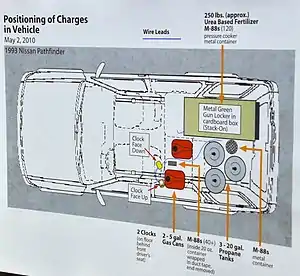
A propane bomb is a type of improvised explosive device which uses commercially available bottled gas cylinders, a kind of BLEVE. The devices have been used in terror attacks and school bombing plots.
A notable incident in which a propane bomb was used was during the Columbine High School massacre in which the two assailants Eric Harris and Dylan Klebold intended to kill students in the school cafeteria by using propane tanks fitted with timing devices. The bombs failed to detonate.
Description
Often propane bombs are crudely made, involving wiring a device into the propane tank(s) set to a timer or remote detonation. The expanding gas of the ignited propane bursts the shell of the tank and causes the explosion, similar to the fundamentals of a pressure cooker bomb or a pipe bomb.
History
1980–1999
The 1983 Beirut barracks bombings killed 305 U.S. and French peacekeepers during the Lebanese Civil War with two truck bombs. The explosive mechanism was a gas-enhanced device consisting of compressed butane in canisters employed with Pentaerythritol tetranitrate to create a fuel-air explosive.[1][2] The bomb was carried on a layer of concrete covered with a slab of marble to direct the blast upward.[3] Despite the lack of sophistication and wide availability of its component parts, a gas-enhanced device can be a lethal weapon. These devices were similar to fuel-air or thermobaric weapons, explaining the large blast and damage.[4]
In 1994, Hamas claimed responsibility for a car in Israel packed with nails and propane gas that exploded, killing the driver and seven people at a bus stop.[5]
During the Columbine High School massacre, Harris and Klebold planted two 20-pound (9.1 kg) propane bombs in the school cafeteria. The plan was to kill as many students as possible in the explosions and to shoot down survivors when they attempt to flee. Both bombs failed to detonate, so the two students opened fire anyway, killing 12 students and 1 teacher, and injuring 21 others before both committing suicide. Another 20-pound (9.1 kg) propane bomb was found south of the school, presumably as a diversionary device for the police. Other propane tanks were found in their cars, for use as car bombs.
2000–2009
The Ghriba synagogue bombing involved a truck loaded with propane tanks detonating with its driver outside a Jewish synagogue in Tunisia, killing 16 and wounding 26. The attack was funded by al-Qaeda, organised by Khalid Sheikh Mohammed.
During the 2007 Glasgow International Airport attack, a Jeep Cherokee loaded with propane tanks crashed into the entrance of the Glasgow International Airport. The attackers appear to have been Muslims unaffiliated with any organization who were disgruntled about the War on Terror taking place in the Middle East.
2010–present
The 2010 Times Square car bombing attempt was an attempted terrorist attack using propane tanks in an improvised car bomb. The perpetrator Faisal Shahzad admitted that he had trained at a Pakistani terrorist training camp prior to the attack,[6] and said he wanted revenge against the United States for drone strikes in Pakistan.[7]
The 2012 Brindisi school bombing claimed the life of one 16-year-old female student and injured five others. It was originally blamed on the Mafia, but the confessing bomber revealed no convincing motive.
During November 2012, in Vancouver, a propane bomb was found on an elevated SkyTrain track, along with a second device. A passenger had spotted a red canister on the track which looked like small propane tanks with straps and wires. Canisters the size of a fire extinguisher were attached to an explosive device.[8][9]
James Lee, armed with two starting pistols, a pipe bomb, four propane tanks and an oxygen tank, took three people hostage during the Discovery Communications headquarters hostage crisis, but Lee was shot dead by police. Lee's motive was believed to have been grounded in environmental activism.[10]
In 2016, a French Muslim teenager was arrested after attempting to ignite propane tanks in her car outside Notre Dame Cathedral in Paris.[11]
In 2017, an Allah-Las concert in Rotterdam was canceled after Spanish police, investigating the Barcelona attacks, tipped off Dutch police of a plan to bomb the concert.[12] A white van containing 100 butane canisters was found near the concert.
In 2018 in Melbourne, Australia, a Somali terrorist ignited propane tanks in his car before stabbing three civilians and attempting to kill police officers.[13]
Notes
- ↑ "Peterson v. Islamic Republic of Iran, U.S. District Court for the District of Columbia" (PDF). Perles Law Firm. Washington, DC. 2003. Archived from the original (PDF) on May 5, 2006. Retrieved 23 December 2014.
- ↑ Geraghty, Timothy J.; (2009). Peacekeepers at War: Beirut 1983--The Marine Commander Tells His Story p.185, Potomac Books. ISBN 978-1-59797-425-7. page 185.
- ↑ Time Magazine Jan 2, 1984 Beirut: Serious Errors in Judgment - TIME Archived January 23, 2011, at the Wayback Machine
- ↑ Paul Rogers(2000)"Politics in the Next 50 Years: The Changing Nature of International Conflict Archived 2009-03-29 at the Wayback Machine"
- ↑ Terror strikes Israel on mourning day April 08, 1994|By Doug Struck | Doug Struck,Jerusalem Bureau of The Sun
- ↑ "AP sources: Bomber trained at Pakistan terror camp". The Washington Post. Retrieved May 4, 2010.
- ↑ Bomb motive, LA times 8 May 2010.
- ↑ SkyTrain Bomb Scares Hit Metrotown Station, Surrey The Huffington Post B.C. | Posted: 11/02/2012
- ↑ Police, security on alert after bomb found on SkyTrain tracks near Vancouver Canadian Press | 12/11/03
- ↑ "New details emerge about Discovery hostage situation: Bomb was the big risk with gunman December 7, 2010". Archived from the original on August 26, 2018. Retrieved April 14, 2013.
- ↑ "Paris terror arrest after gas tanks found in Notre Dame car". BBC News. 7 September 2016.
- ↑ "Allah-Las gig cancelled in Rotterdam due to terror warning". The Guardian. 2017-08-23.
- ↑ "Melbourne terror attack suspect shot dead". BBC News. 2018-11-09. Retrieved 2018-11-09.